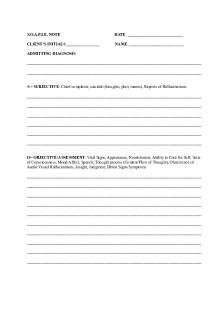Psych Vocabulary - Note PDF

| Title | Psych Vocabulary - Note |
|---|---|
| Author | JULYNE |
| Course | Persona y humanismo |
| Institution | Universidad Iberoamericana |
| Pages | 1 |
| File Size | 59.1 KB |
| File Type | |
| Total Downloads | 62 |
| Total Views | 144 |
Summary
. Selective attrition: the tendency for certain kinds of people to drop out of a study
2. Cohort : a group of people born at a particular time
3. Fetal Alcohol Syndrome: alcohol decrease neuron’s arousal and make them
self-distruct
4. Schema: an org way of interacting with ob...
Description
WK2 1. Corpus callosum: a set of axons that connect the left and right hemispheres of the cerebral cortex 2. Prefrontal cortex: important for the memory of what has just happened and what you are planning to do next 3. Mirror neurons: active when you make a movement and when you watch someone else make a similar movement 4. Endocrine system: glands that produce hormones and release them to blood (controlled by the autonomic system) 5. Hormone: chemicals released by glands and conveyed by blood to alter activity in organs 6. Chromosome: strands of hereditary material 7. Gene: section along each chromosome that control chemical reactions that direct development 8. Epigenetics: a field that observe changes in gene expression without modification of DNA sequence 9. Multiplier Effect: a small initial adv in some behavior (genetic) alters the environment and magnifies that advantage 10. Evolution: a gradual change in frequency of various genes from one generation to next WK 3 1. 2. 3. 4.
Stimuli: energies in env that affect what we do Receptor: specialized cell that convert env energies into signals for nervous system Fovea: central area of human retina Brightness Contrast: increase / decrease in object’s apparent brightness by comparison to objects around it 5. Blind spot: retinal area where the optic nerve exists 6. Sound wave: vibration in the air / other medium 7. Cochlea: fluid-filled canals of snail-shaped organ that contains receptors for hearing 8. Conduction deafness: results when bones connected to eardrum fail to transmit sound waves properly to the cochlea 9. Nerve deafness: resulting from damage to cochlea, hair cells, or auditory nerve a. Disease, heredity, loud nouse exposure = cause 10. Subliminal perception: a stimulus can influence behavior even when the observer has no conscious perception of it
WK 4 1. Selective attrition: the tendency for certain kinds of people to drop out of a study 2. Cohort : a group of people born at a particular time 3. Fetal Alcohol Syndrome: alcohol decrease neuron’s arousal and make them self-distruct 4. Schema: an org way of interacting with objects 5. Assimilation: applying an old schema to new objects / problems 6. Accommodation: modifying an old schema to fit a new object / problem 7. Equilibrium: establishment of balance between the assimilation and accommodation 8. Theory of mind: an understanding that other people have a mind, and each person knows some things that other people do not know
9. Attachment: a feeling of closeness toward another person 10. Temperament: tendency to be active, inactive, and respond vigorously or quietly to new stimuli 11. Identity crisis: concern with decisions about the future and quest for self-understanding 12. Midlife transition: a period of reassessing goals, setting new ones, and preparing for rest of life (middle adulthood) 13. Terror-management theory: cope with fear of death by avoiding thoughts about death and by affirming reassuring beliefs 14. Biculturalism: partial identification with 2 cultures WK 5 1. Memory: retention of information 2. Information-processing model: info that enters the system is processed, coded, and stored 3. Semantic memory: memory of principles and facts 4. Source amnesia: forgetting when, where, or how your learned something 5. Consolidation: converting a short-term memory into a long-term memory 6. Mnemonic device: any memory aid based on encoding items in a special way 7. Repression: the process of moving an unacceptable memory to the unconscious mind a. Remembering Traumatic experience depends on: age at the time of event, severity, and reaction of family members i. Old age at the event time + severe (remember better) > young + supportive family 8. Dissociation: memory that one has stored but cannot retrieve...
Similar Free PDFs

Psych Vocabulary - Note
- 1 Pages

Psych Vocabulary Chapter 1
- 2 Pages

Soapie (Psych) note - good
- 3 Pages

SOAP Note - SOAP Notes for Psych
- 3 Pages

Vocabulary
- 1 Pages

Note - Note
- 27 Pages

Psych
- 54 Pages

Note 40 - note
- 4 Pages

Note 3 - Note
- 4 Pages

Note 6 - note
- 5 Pages

Note 10 - note
- 5 Pages

ES Note-mid - note
- 30 Pages

Note 6 - note
- 4 Pages

Note 10 - note
- 7 Pages
Popular Institutions
- Tinajero National High School - Annex
- Politeknik Caltex Riau
- Yokohama City University
- SGT University
- University of Al-Qadisiyah
- Divine Word College of Vigan
- Techniek College Rotterdam
- Universidade de Santiago
- Universiti Teknologi MARA Cawangan Johor Kampus Pasir Gudang
- Poltekkes Kemenkes Yogyakarta
- Baguio City National High School
- Colegio san marcos
- preparatoria uno
- Centro de Bachillerato Tecnológico Industrial y de Servicios No. 107
- Dalian Maritime University
- Quang Trung Secondary School
- Colegio Tecnológico en Informática
- Corporación Regional de Educación Superior
- Grupo CEDVA
- Dar Al Uloom University
- Centro de Estudios Preuniversitarios de la Universidad Nacional de Ingeniería
- 上智大学
- Aakash International School, Nuna Majara
- San Felipe Neri Catholic School
- Kang Chiao International School - New Taipei City
- Misamis Occidental National High School
- Institución Educativa Escuela Normal Juan Ladrilleros
- Kolehiyo ng Pantukan
- Batanes State College
- Instituto Continental
- Sekolah Menengah Kejuruan Kesehatan Kaltara (Tarakan)
- Colegio de La Inmaculada Concepcion - Cebu

